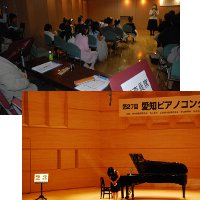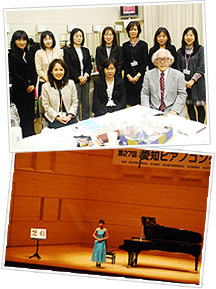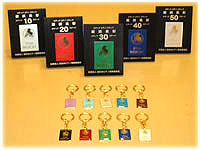Networking Local Piano Competitions Provides Diversity in Learning Environment
 From 2010, PTNA has taken the role of agents of several local piano competitions in Japan, apart from our PTNA Piano Competition. This is based on the similar principle as networking local piano teachers, which we started 45 years ago, to provide wider possibility and diversity to their learning environment.
From 2010, PTNA has taken the role of agents of several local piano competitions in Japan, apart from our PTNA Piano Competition. This is based on the similar principle as networking local piano teachers, which we started 45 years ago, to provide wider possibility and diversity to their learning environment.
Since the local autonomy in cultural activities has expanded these days, it is said that big cities which exceed populations of 300,000 (40 cities as of 2010) are likely to host at least one local piano competition, and some are administered by PTNA members. In expectation of bigger numbers of participants and a wider variety of talents, five local piano competitions have come to join this program so far.
 One of the partners, Aichi piano competition had 294 applicants this year and nearly 60% of them applied through PTNA. According to the administrator, Aichi Piano Study Group led by Prof.Hideo SUGIURA (PTNA trustee), the competition offers repertoires which are difficult but worthwhile studying. Even early teenagers must play at least 5-6 works.
One of the partners, Aichi piano competition had 294 applicants this year and nearly 60% of them applied through PTNA. According to the administrator, Aichi Piano Study Group led by Prof.Hideo SUGIURA (PTNA trustee), the competition offers repertoires which are difficult but worthwhile studying. Even early teenagers must play at least 5-6 works.
On the other hand, at the Miki-gakki Fresh Concert-Competition (Osaka), participants have to prepare only one work of their own choice. This competition offers as many chances as possible to young children. At the Nakatsu 'An die Musik' Competition (Oita), named after a lieder of Schubert, the administrator Ms.Keiko MIYAHARA (chief of the Nakatsu-Yukichi Station) focuses on refinement of the musicality and imagination of young children. In 2010, 71 out of 200 were the applicants through PTNA.
 Then what is the advantage to apply through this affiliated program? Those applicants would obtain one 'stage point' at the time of the application. It is to record how many times they make public performances, and when they obtain a certain amount of points (5,10,15,20 points..), they shall also be entitled to receive 'the award for continuous learning'. This system has been applied to the PTNA Piano Competition and PTNA Piano STEP, and now it is extended to affiliated competitions. It enables bigger numbers of children to take advantage of multiple opportunities to play on stage, and at the same time, to establish consistent lifelong learning practice.
Then what is the advantage to apply through this affiliated program? Those applicants would obtain one 'stage point' at the time of the application. It is to record how many times they make public performances, and when they obtain a certain amount of points (5,10,15,20 points..), they shall also be entitled to receive 'the award for continuous learning'. This system has been applied to the PTNA Piano Competition and PTNA Piano STEP, and now it is extended to affiliated competitions. It enables bigger numbers of children to take advantage of multiple opportunities to play on stage, and at the same time, to establish consistent lifelong learning practice.
Interestingly, it even shows the difference in students' learning habits. Those who have already reached 20 "stage points" account for 10% of participants under this new system, whereas the equivalents account for 5.3% of the whole stage point holders. This number implies their disposition to explore possibilities continually and spontaneously.